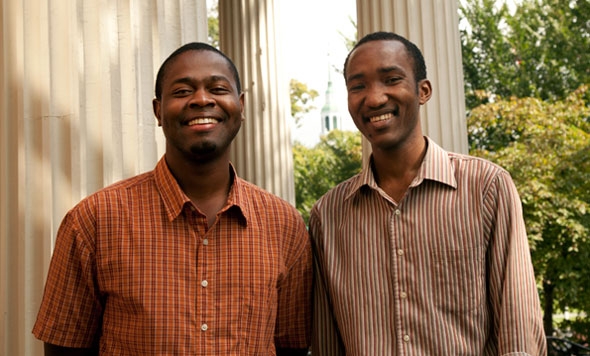Two medical students from Haiti—Jean-Kensley Germinal and Théodule Jean-Baptiste—spent the summer term at Dartmouth, taking classes and shadowing doctors in the OB-GYN and emergency departments at Dartmouth Hitchcock-Medical Center (DHMC). They are the sixth and seventh Haitian students to study at Dartmouth College and Dartmouth Medical School (DMS), including full-time undergraduate Yves-Marie Duperval ’14, since the country was devastated by a 7.0 magnitude earthquake in January 2010.

Jean-Kensley Germinal, left, and Théodule Jean-Baptiste, both students at the State University of Haiti Medical School in Port-au-Prince, spent the summer at Dartmouth thanks to an exchange program facilitated by the Haitian Education & Leadership Program. (photo by Joseph Mehling ’69)
Germinal and Jean-Baptiste, who are in their fifth and sixth years respectively at the State University of Haiti Medical School in Port-au-Prince, were part of an exchange program facilitated by the Haitian Education & Leadership Program (HELP) in conjunction with the staff at The Dartmouth Center for Health Care Delivery Science. They are now the second group of students from HELP who have taken classes at Dartmouth as part of the Dartmouth Haiti Response initiative.
Germinal shadowed medical personnel in the OB-GYN department, with mentor Dr. Karen George, while Jean-Baptiste was in the emergency department with Dr. Scott Rodi, who is the Dartmouth emergency department representative for the Mirebalais Teaching Hospital in Haiti. Germinal and Jean-Baptiste also worked with other DHMC medical professionals, residents, and DMS students.
Both students were impressed by the level of care and medical technology they encountered at Dartmouth’s teaching hospital in Lebanon, N.H. “Things are very different here from Haiti,” says Germinal. “A lot of technology, a lot of devices, and many people here who are very good.”
Jean-Baptiste says he was particularly struck by how the hospital is managed. “My first goal was to learn medical knowledge, but seeing how the system works and how everything is set up to work efficiently, this is a big part of the health-care delivery,” he says. “If your system is not working well, you can have the best doctor but you won’t have a good health-care delivery.”
Both also took Professor of Sociology Misagh Parsa’s course on the “Sociology of International Development.” “This class gave me such a broad view of how the world is functioning,” says Jean-Baptiste, who also audited a global water resources class in the geography department and volunteered as a Rassias Center French teaching assistant.
The pair return to Port-au-Prince this week to resume their medical studies.
While conditions are slowly improving in their home republic, they stress that continued outside aid and assistance for Haitian education will be vital to their country’s future. Dartmouth Haiti Response plans to continue working with partners in Haiti on educational and medical initiatives.
“Haiti is not just what you see in the news because very often you just see the bad things,” says Jean-Baptiste. “We’ve got good people there. But we’d be very happy if they [volunteers and teachers] came and helped with education for our people. We don’t think there’s a better way than education to remove the poverty there.”
